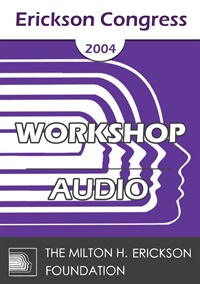
- Average Rating:
- Not yet rated
- Topic Areas:
- Workshops | Brief Therapy | Ericksonian Psychotherapy
- Categories:
- Erickson Congress | Erickson Congress 2004
- Faculty:
- Steve Andreas, MA, NLP
- Duration:
- 2:00:08
- Format:
- Audio Only
- Original Program Date:
- Dec 04, 2004
- Short Description:
- This workshop offers a hands-on exploration of how clients organize time internally and how subtle shifts in that structure can change emotion, behavior, and choice. Through live demonstrations and guided experiments, it shows how timelines shape memory, planning, anxiety, guilt, and motivation, and how content-free adjustments can reduce distress, improve focus, and increase flexibility across everyday clinical issues.
- Price:
- $15.00 - Base Price
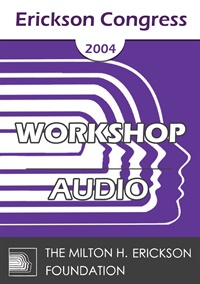
- Average Rating:
- Not yet rated
- Topic Areas:
- Workshops | Brief Therapy | Eating Disorders
- Categories:
- Erickson Congress | Erickson Congress 2004
- Faculty:
- Giorgio Nardone
- Duration:
- 1:26:05
- Format:
- Audio Only
- Original Program Date:
- Dec 05, 2004
- Short Description:
- Eating disorders are rapidly evolving towards a kind of "refined specialization." Young women with bulimic or anorexic tendencies have discovered different ways that enable them to control their weight without giving up the pleasure of eating, thus nowadays we encounter new forms of eating disorders. All these have different persisting patterns and attempted solutions. As a result, each requires a different treatment protocol.
- Price:
- $15.00 - Base Price

- Average Rating:
- Not yet rated
- Topic Areas:
- Workshops | Brief Therapy
- Categories:
- Erickson Congress | Erickson Congress 2007
- Faculty:
- Rubin Battino, MS
- Duration:
- 1:52:15
- Format:
- Audio Only
- Original Program Date:
- Dec 06, 2007
- Short Description:
- A hands-on introduction to very brief therapy grounded in expectancy, choice, and experiential change. Participants learn how therapist belief, language, and structure shape outcomes, and how tools like acting “as if,” miracle questions, ambiguous assignments, and ordeals can rapidly loosen stuck patterns. Through live exercises and clinical reasoning, the session shows how brief work can shift meaning, restore agency, and mobilize change without extended treatment or diagnosis-driven models.
- Price:
- $15.00 - Base Price

- Average Rating:
- Not yet rated
- Topic Areas:
- Short Courses | Ericksonian Hypnosis and Therapy Techniques | Trauma | Brief Therapy | Thought Field Therapy | Psychotherapy
- Categories:
- Erickson Congress | Erickson Congress 2007
- Faculty:
- Suzanne M. Connolly, MSW, CISW
- Duration:
- 1:19:13
- Format:
- Audio Only
- Original Program Date:
- Dec 07, 2007
- Short Description:
- Attendees will be introduced to Ericksonian interventions and Thought Field Therapy interventions. They have been successfully utilized by the presenter to treat the symptoms of trauma in clinical settings, in the field (Rwanda and other African countries) and in large group settings (Charity Hospital and other new Orleans institutions.)
- Price:
- $15.00 - Base Price

- Average Rating:
- Not yet rated
- Topic Areas:
- Short Courses | Brief Therapy | Couples Therapy | Ericksonian Hypnosis and Therapy Techniques | Hypnosis
- Categories:
- Erickson Congress | Erickson Congress 2007
- Faculty:
- Ruperto Charles
- Duration:
- 1:19:37
- Format:
- Audio Only
- Original Program Date:
- Dec 07, 2007
- Short Description:
- This workshop will offer a Semi-Structured Guide for interviewing couples, either together or individually, using hypnotic language and circular crossed questioning. A format will be given to lead the first and subsequent sessions. It will show how to construct questions, reframing and tasks using Ericksonian hypnosis and solution-focused therapy to get good results in about four sessions.
- Price:
- $15.00 - Base Price

- Average Rating:
- Not yet rated
- Topic Areas:
- Short Courses | Brief Therapy | Ericksonian Hypnosis and Therapy Techniques | Communication
- Categories:
- Erickson Congress | Erickson Congress 2007
- Faculty:
- John Lentz, D. Min.
- Duration:
- 1:19:33
- Format:
- Audio Only
- Original Program Date:
- Dec 07, 2007
- Short Description:
- This presentation offers a completely new way of thinking about miscommunication, along with simple Ericksonian solutions. This perspective is based on Ericksonian approaches and from the author's observations of miscommunications. Observable trends of problem communication that results in mild trances will be illustrated along with ways to overcome and repair common miscommunication. Using an experiential and didactic approach, this workshop will provide participants with useable tools they can also teach their clients.
- Price:
- $15.00 - Base Price

- Average Rating:
- Not yet rated
- Topic Areas:
- Short Courses | Brief Therapy | Psychopharmacology
- Categories:
- Erickson Congress | Erickson Congress 2007
- Faculty:
- David Barnum | Mary Lu Egidy, ARNP, CS
- Duration:
- 1:17:32
- Format:
- Audio Only
- Original Program Date:
- Dec 07, 2007
- Short Description:
- Genuine integration of highly skilled psychotherapy and pharmacotherapy has, for some, become a lost art. However, careful use of both can be highly effective for clients. Using a model we have developed over 10 years of collaboration on complex child, family and adult cases, we demonstrate how Ericksonian therapies and biological treatments can be skillfully integrated to improve outcomes for our clients. Case examples will bring the core elements of our model to life.
- Price:
- $15.00 - Base Price

- Average Rating:
- Not yet rated
- Topic Areas:
- Short Courses | Brief Therapy | Ericksonian Hypnosis and Therapy Techniques | Hypnosis | Solution Oriented Approach | Unconscious Processes
- Categories:
- Erickson Congress | Erickson Congress 2007
- Faculty:
- Joseph Dowling, MS, LPC
- Duration:
- 1:15:27
- Format:
- Audio Only
- Original Program Date:
- Dec 07, 2007
- Short Description:
- Milton H. Erickson, MD understood that "the conscious (thinking) mind doesn't do much of anything of much significance . . . while the unconscious mind is an infinite storehouse of dreams, potentials and solutions . . ." This short course will teach a brief, solution-focused, strategic, hypnotic approach to anxiety related disorders. Participants will learn to employ Ericksonian interventions including solution-focused questions, strategic task assignments, and formal/conversational hypnosis via live demonstration, experiential exercise and case studies.
- Price:
- $15.00 - Base Price

- Average Rating:
- Not yet rated
- Topic Areas:
- Short Courses | Phobia | Anxiety | Brief Therapy
- Categories:
- Erickson Congress | Erickson Congress 2007
- Faculty:
- Kevin Humphrey, MA | Allan Sargent | Marilyn Sargent
- Duration:
- 1:12:25
- Format:
- Audio Only
- Original Program Date:
- Dec 07, 2007
- Short Description:
- Sargent's "Phobia Release Process; Heal the Essence of Self;" What if you could neutralize a phobic response in about 20 minutes, giving your clients a choice of how they respond in the face of that old stimulus? The Sargent Phobia Release Process stops knee-jerk, out-of-control panic reactions, and more importantly, gives the clinician the tools to then discover the underlying perceived threat to safety. Update the brain's database by reprogramming the amygdale in each hemisphere.
- Price:
- $15.00 - Base Price

- Average Rating:
- Not yet rated
- Topic Areas:
- Short Courses | Brief Therapy | Ericksonian Hypnosis and Therapy Techniques
- Categories:
- Erickson Congress | Erickson Congress 2007
- Faculty:
- Robert Williams, PhD | Gordon Dodge, PhD
- Duration:
- 1:19:36
- Format:
- Audio Only
- Original Program Date:
- Dec 07, 2007
- Short Description:
- This workshop will give real life examples of Ericksonian brief intervention, leading not only to resolution of community conflict, but to the strengthening of local support networks. School, legal, neighborhood, religious and "new movement" conflicts will be addressed.
- Price:
- $15.00 - Base Price
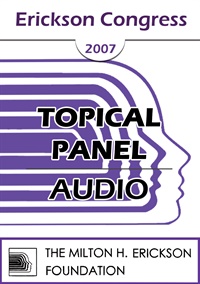
- Average Rating:
- Not yet rated
- Topic Areas:
- Topical Panels | Brief Therapy | Hypnosis
- Categories:
- Erickson Congress | Erickson Congress 2007
- Faculty:
- Douglas Flemons, PhD | Camillo Loriedo, MD, PhD | Alexander Simpkins, PhD | Annellen M. Simpkins, PhD
- Duration:
- 55:31
- Format:
- Audio Only
- Original Program Date:
- Dec 08, 2007
- Short Description:
- IC07 Topical Panel 03 - Hypnosis in Brief Therapy - Douglas Flemons, Ph.D., Camillo Loriedo, M.D., Alexander Simpkins, Ph.D. and Annellen Simpkins, Ph.D.
- Price:
- $15.00 - Base Price
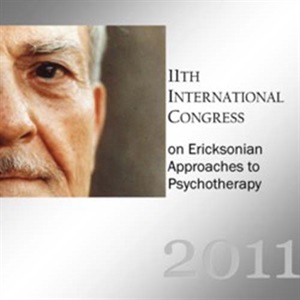
- Average Rating:
- Not yet rated
- Topic Areas:
- Conversation Hours | Brief Therapy
- Categories:
- Erickson Congress | Erickson Congress 2011
- Faculty:
- Wendel Ray, PhD
- Duration:
- 1:00:44
- Format:
- Audio Only
- Original Program Date:
- Dec 10, 2011
- Short Description:
- IC11 Conversation Hour 05 – Paul Watzlawick: Master of Brief Therapy – Wendel Ray, PhD
- Price:
- $15.00 - Base Price
Tags: Brief Therapy Paul Watzlawick

- Average Rating:
- Not yet rated
- Topic Areas:
- Dialogues | Brief Therapy
- Categories:
- Erickson Congress | Erickson Congress 2011
- Faculty:
- Wendel Ray, PhD | Stephen Gilligan, PhD | Harriet Hollander, PhD
- Duration:
- 1:02:14
- Format:
- Audio Only
- Original Program Date:
- Dec 10, 2011
- Short Description:
- IC11 Dialogue 04 – Core Elements of Brief Therapy – Stephen Gilligan, PhD, Harriet Hollander, PhD and Wendel Ray, PhD
- Price:
- $15.00 - Base Price
Tags: Brief Therapy
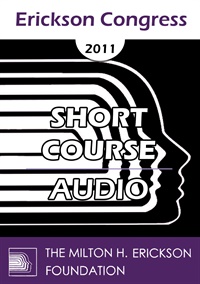
- Average Rating:
- Not yet rated
- Topic Areas:
- Short Courses | Utilization | Brief Therapy | Ericksonian Hypnosis and Therapy Techniques | Solution Oriented Approach
- Categories:
- Erickson Congress | Erickson Congress 2011
- Faculty:
- Michael Reiter, PhD | Arlene Brett-Gordon, PhD
- Duration:
- 1:17:52
- Format:
- Audio Only
- Original Program Date:
- Dec 09, 2011
- Short Description:
- Milton Erickson’s notions of utilization and the development of expectations are the foundation of Solution Focused Brief Therapy (SFBT). This therapeutic approach assists clients in utilizing their own re-sources and developing hope and expectancy of change to achieve their goals. This workshop will provide participants with an in-depth explanation of how SFBT helps clients by instilling hope and infusing an expectation of change in its core philosophy and therapeutic interventions.
- Price:
- $15.00 - Base Price
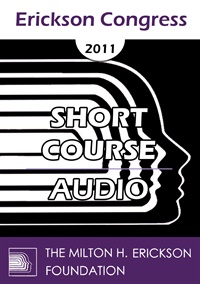
- Average Rating:
- Not yet rated
- Topic Areas:
- Hypnotherapy | Short Courses | Pain and Healing | Brief Therapy | Self-Hypnosis
- Categories:
- Erickson Congress | Erickson Congress 2011
- Faculty:
- Jeffrey Feldman, PhD
- Duration:
- 1:30:08
- Format:
- Audio Only
- Original Program Date:
- Dec 09, 2011
- Short Description:
- This short course will introduce a treatment approach that targets the affective dimension of pain. The emotion specific wording and elicitation of positive state dependent learning can be used in a brief therapy approach whether or not patients' feelings of anger, sadness, or anxiety are associated with physical pain.
- Price:
- $15.00 - Base Price
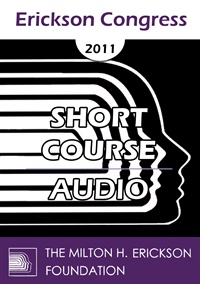
- Average Rating:
- Not yet rated
- Topic Areas:
- Short Courses | Hypnosis | Brief Therapy | Cognitive Behavior Therapy (CBT)
- Categories:
- Erickson Congress | Erickson Congress 2011
- Faculty:
- Assen Alladin, PhD
- Duration:
- 1:32:25
- Format:
- Audio Only
- Original Program Date:
- Dec 09, 2011
- Short Description:
- In this short course, hypnosis is woven into CBT methods to help clients break habitual rumination, shift emotional states, and strengthen self-regulation. The session offers practical ways to use trance work to deepen cognitive change, support physiological calm, and reduce the likelihood of relapse in anxiety and depression.
- Price:
- $15.00 - Base Price
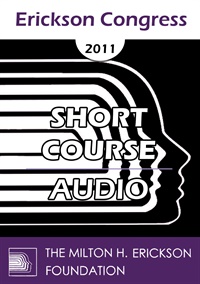
- Average Rating:
- Not yet rated
- Topic Areas:
- Short Courses | Brief Therapy | Couples Therapy | Psychotherapy | Intimacy | Relationships | Solution Oriented Approach
- Categories:
- Erickson Congress | Erickson Congress 2011
- Faculty:
- Robert Johansen, PhD | Ian Johansen, PhD | Todd Gaffney, PhD
- Duration:
- 41:06
- Format:
- Audio Only
- Original Program Date:
- Dec 09, 2011
- Short Description:
- The presentational will introduce a new and brief cognitive model for treating couples. It is a solution-focused model that proposes specific steps on how to differentiate types of love and how these impact an intimate relationship. The participants will develop strategies on how to effectively manage needs in an intimate relationship.
- Price:
- $15.00 - Base Price
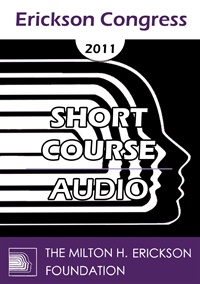
- Average Rating:
- Not yet rated
- Topic Areas:
- Short Courses | Brief Therapy | Subliminal Therapy | Unconscious Processes
- Categories:
- Erickson Congress | Erickson Congress 2011
- Faculty:
- Edwin Yager, PhD
- Duration:
- 1:31:56
- Format:
- Audio Only
- Original Program Date:
- Dec 09, 2011
- Short Description:
- Therapists will learn Subliminal Therapy (ST), a psychodynamic technique used to accomplish consciously desired change. ST is a hypnotically medicated and utilizes the capabilities of a higher level of the patient’s intelligence that exists in the unconscious domain. ST empowers the patient by providing awareness of causal influences, thereby facilitating resolution by the patient. ST is described, its effectiveness is quantified and justified, and typical applications are detailed. Additionally, participants will witness a demonstration of the technique.
- Price:
- $15.00 - Base Price
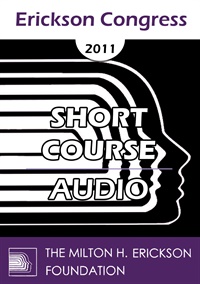
- Average Rating:
- Not yet rated
- Topic Areas:
- Short Courses | Redecision Therapy | Ericksonian Hypnosis and Therapy Techniques | Transactional Analysis | Brief Therapy
- Categories:
- Erickson Congress | Erickson Congress 2011
- Faculty:
- Janet Lee O'Connor, EdS | Del Worley, MC
- Duration:
- 1:19:29
- Format:
- Audio Only
- Original Program Date:
- Dec 09, 2011
- Short Description:
- This presentation will demonstrate the utilization of the Ericksonian position on change within the framework of Redecision Transactional Analysis. Permission, co-creating a unique response, develop-mental meaning of symptoms, and creating new responses to the environment will be illustrate using volunteers attending the program.
- Price:
- $15.00 - Base Price

- Average Rating:
- Not yet rated
- Topic Areas:
- Short Courses | Family Constellations | Brief Therapy | Family Therapy
- Categories:
- Erickson Congress | Erickson Congress 2011
- Faculty:
- Dan Booth Cohen, PhD
- Duration:
- 1:27:36
- Format:
- Audio Only
- Original Program Date:
- Dec 09, 2011
- Short Description:
- This workshop includes Systemic Family Constellation therapy. Redefined by Bert Hellinger and others, it has gained acceptance in Europe as a groundbreaking advancement in brief form therapy. The process explores how transgenerational traumas remain active. In a single session, the imaginal family system is transformed. The burden of memory becomes an enduring source of strength and healing.
- Price:
- $15.00 - Base Price
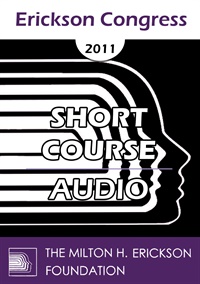
- Average Rating:
- Not yet rated
- Topic Areas:
- Anxiety | Short Courses | Ericksonian Hypnosis and Therapy Techniques | Hypnotic Phenomena | Brief Therapy | Utilization
- Categories:
- Erickson Congress | Erickson Congress 2011
- Faculty:
- Antonio Bustillo, PhD
- Duration:
- 1:26:29
- Format:
- Audio Only
- Original Program Date:
- Dec 09, 2011
- Short Description:
- IC11 Short Course 37 - The Use of Hypnotic Phenomena for Test Anxiety: Brief Ericksonian Solutions at Work - Antonio Bustillo, PhD This is a clinical presentation of a five step model for tailoring hypnotherapy interventions in test anxiety cases utilizing the client’s spontaneous trance phenomena, allowing the clinician’s ability to utilize and maximize the client’s internal resources based on his/her total life experience. Clinical cases will be presented of this hands-on approach of Erickson’s utilization philosophy.
- Price:
- $15.00 - Base Price
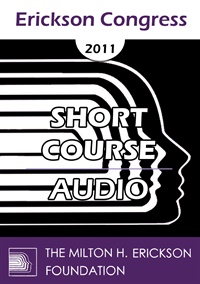
- Average Rating:
- Not yet rated
- Topic Areas:
- Short Courses | Brief Therapy | Children and Adolescent Therapy | Language of Hypnosis | Ericksonian Hypnosis and Therapy Techniques | Metaphors | Utilization
- Categories:
- Erickson Congress | Erickson Congress 2011
- Faculty:
- Marilyn Wedge
- Duration:
- 1:00:05
- Format:
- Audio Only
- Original Program Date:
- Dec 09, 2011
- Short Description:
- The language a therapist uses to conceptualize and treat a problem determines whether or not that problem can be resolved effectively. This workshop introduces a new model, child-focused family therapy, which is a respectful and effective technique for treating severe problems of children. This method includes a precisely worded opening question, a strategic dialogue with parents and children, Erickson’s principle of utilization, and the use of metaphor to open up solutions.
- Price:
- $15.00 - Base Price
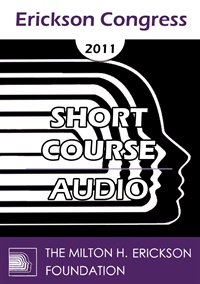
- Average Rating:
- Not yet rated
- Topic Areas:
- Short Courses | Art and Creativity | Brief Therapy | Consciousness | Unconscious Processes | Hypnosis | Resistance | Music
- Categories:
- Erickson Congress | Erickson Congress 2011
- Faculty:
- Alan Redstone, MA
- Duration:
- 1:25:54
- Format:
- Audio Only
- Original Program Date:
- Dec 09, 2011
- Short Description:
- Music is an effective Brief Therapy tool that can be used to instantly access right brain intelligence, elicit conscious and unconscious material for processing, and induce hypnotic states that render listeners receptive to positive suggestions of wellness, relaxation, and integration. A single short song can cut through resistance, setting the perfect atmosphere for a highly productive session.
- Price:
- $15.00 - Base Price
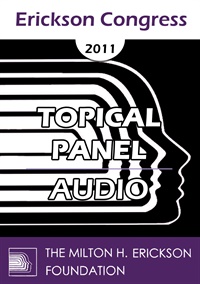
- Average Rating:
- Not yet rated
- Topic Areas:
- Hypnosis | Topical Panels | Brief Therapy
- Categories:
- Erickson Congress | Erickson Congress 2011
- Faculty:
- Douglas Flemons, PhD | Teresa Robles, MA, PhD | Claude Virot, MD | Charlotte Wirl
- Duration:
- 59 Minutes
- Format:
- Audio Only
- Original Program Date:
- Dec 07, 2011
- Short Description:
- Topical Panel on Hypnosis in Brief Therapy, featuring Douglas Flemons, Teresa Robles, Claude Virot, and Charlotte Wirl
- Price:
- $20.00 - Base Price
Tags: Hypnosis Brief Therapy
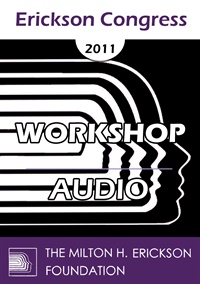
- Average Rating:
- Not yet rated
- Topic Areas:
- Workshops | Brief Therapy | Experiential Therapy | Hypnosis | Therapist Development
- Categories:
- Erickson Congress | Erickson Congress 2011
- Faculty:
- Rubin Battino, MS
- Duration:
- 59 Minutes
- Format:
- Audio Only
- Original Program Date:
- Dec 07, 2011
- Short Description:
- This workshop presents a practical, experience-based approach to very brief therapy built around expectation, language, and choice. Participants learn how tools like the miracle question, acting “as if,” reframing, metaphor, and ambiguous assignments can unlock change quickly without extensive assessment or diagnosis. Through live demonstrations and guided exercises, the session shows how small shifts in meaning and expectation can produce outsized clinical impact, often within a single session.
- Price:
- $20.00 - Base Price

